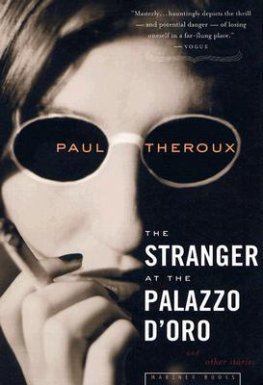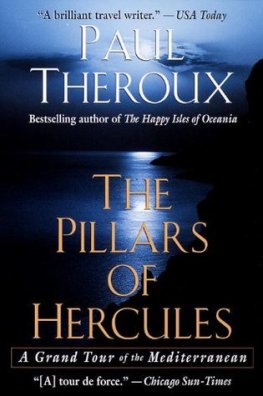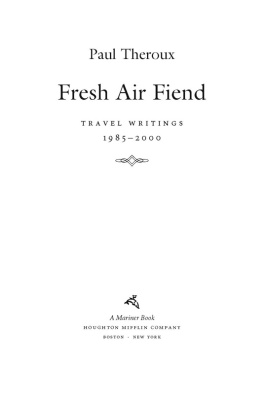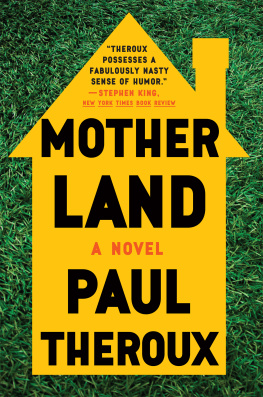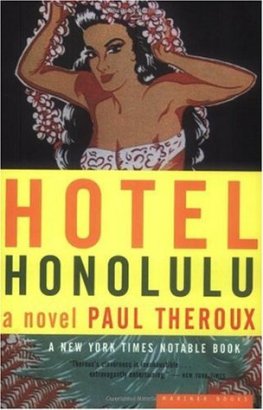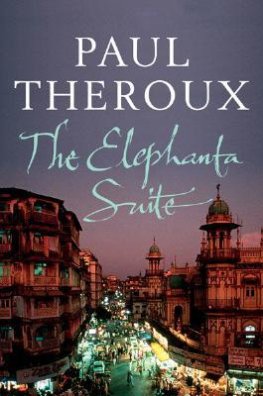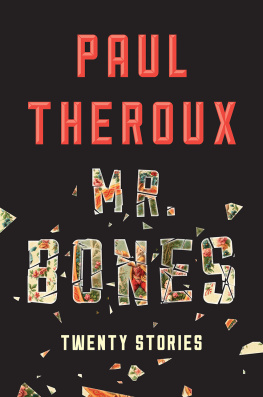Paul Theroux
The Stranger at the Palazzo D'Oro
April is the cruellest month, breeding
Lilacs out of the dead land, mixing
Memory and desire, stirring
Dull roots with spring rain.
T.S. ELIOT, The Waste Land
The Stranger at the Palazzo dOro
THIS IS my only story. Now that I am sixty I can tell it. Years ago, when Taormina was a village most travelers avoided in the summer, because of the heat, I sought it out, to feel the heat. Heat was everything in the poem Snake, that D. H. Lawrence wrote in Taormina. Great names and associations also mattered to me, which was another reason, lingering in the steep town of old stone and fresh flowers, I stopped by the Palazzo d'Oro, loving that name too. Beyond the gilded cast-iron faces on the spiked gateway to the terrace, I saw a handsome couple, a golden-haired woman and a beaky-faced man, dressed in loose white clothes enjoying a big Italian lunch. I imagined being seated at that table. I thought, I want your life the sort of envious wish I was too young to know was like asking for my undoing.
I always excused my waywardness by saying that I was poor and so was forced into this or that course of action. The truth was that I enjoyed taking risks. I should have been ashamed. It was not that I behaved badly, rather that I was secretive and seldom straight. I was creative in my lies. Saying I was poor was one of them.
The world knows me as a hero. My paintings are like good deeds, the pictorial record of my lifetime of travel, the nearest thing to the pharaonic profession of sinlessnessthe negative confession: all my arduous journeys, the discoveries I made my own, the arrivals I turned into triumphs. At a time when celebrated painters stayed home and splashed paint or used slide rules, or glued feathers and broken pots to canvases, painted stripes and circles and whole large monochromes, I was in distant lands painting portraits of people in their landscapes ornery people, kind people, all of them native, none of them posing. I have had my detractors, professional critics mostly, who carped about the explicitness of my line, my clear figures, their sideways glances, but I believe that what rankles are my other figures, the profits I have made. Yet my patrons and collectors have defied the belittlers and chosen to travel with me through my pictures, my exotic views, the many series available in signed lithographs, Pictures of India, Pictures of China, Pictures of Africanot single pictures but narratives.
When I am disparaged for painting accessible pictures I say that my strength is storytelling. What I have never said is that the most resourceful storytellers are the ones who avoid a particular story, the only story the teller has; the very avoidance of it is the reason for the other, wilder tales. The source of fantastic narratives is often this secret, the fantasist using a concealment to hint at the truth, but always skirting the fundamental story. Or the stories may not be bizarre, but numerous and various, for the same reason. This is one ritual of creation. As I say, this is my only story.
Such a traveler as I was could easily have found a way to return to Taormina, but I steered clear of the place, even when I was traveling in Sicily. I resisted, yet I knew that the time would come, when I was myself turning sixty. Not old though everyone else seemed to think so.
At fifty, I had painted a birthday self-portrait of my watchful face, and the subtle suggestion of the haunted eyes only made people praise it for seeming beatific. Ten years passed. But sixty was not an occasion for that sort of self-portrait. I needed to travel, and in the same spirit as before, for in travel I became someone else in this case, in my birthday month, the person I had once been, a boy of twenty-one, in the hot summer of 1962, when I found myself in Sicily, being rebuffed by a girl I liked, Fabiola, a principessa. It means nothing here!
The title meant something to me, though. I had followed her to Palermo from Falconara and Urbino more lovely names but she was home in Sicily and it was forbidden in those days for her to be seen with me unless we were engaged, or nearly so. She had to be my fidanzata, I had to tell her I loved her, otherwise she was a slut, she said. Maybe she suspected I was not very serious, just a brash, too young American (Fabiola was twenty-three) searching for the Italy of Fellini and Antonioni, hungry for experience. I told her I was an existentialist it was a popular word in the Italy of 1962because it was a convenient way of avoiding responsibility. I was intense, impatient, game, and wary of being trapped. These qualities made me a loner. Fabiola wanted romance, she wanted me to adore her. Love me, was the appeal in her eyes, love me and I will give you what you want, but to me love was surrender, love was death. In those days I swore I would not utter the word.
And then I had my life, forty years more, the ones that matter most: the years of family and struggle, love and acclaim, but with enough disillusionment and loss to show there would be worse to come in the tapering off nearer my death.
In Sicily again, a man of sixty, I retraced my steps, avoided the good hotels, looked for traces of my earlier self. Palermo was a more Americanized place these days, and freer women using cell phones, men in blue jeans, even the nuns looked somewhat secular in their dowdy dresses. I called Fabiola, but she was unknown at the only address I had for her and she was not in the phone book. I prowled and looked for the past and found very little that related to the frugal boy I had been, moving lightly through Sicily.
I took the train to Messina, changed for the express to Catania, got off at Taormina-Giardini, climbed the hill, as I had done many years before, glad for this chance to test my memory, sketching in my head, mumbling as I do when I want to remember.
Hotels stand up better than restaurants. The Palazzo dOro on the Via Roma was surrounded by newer and fixed-up places yet it had aged well. I was relieved to see that I could happily stay there again, to recall the old days, and do some serious sketching, and write my story making this visit a significant occasion, or, more than that, a kind of ceremony, a ritual to mark the passing of all those years.
Walking by the pool, a new pool, I saw a girl of no more than seventeen, with short untidy sun-struck hair, sprawled on a striped chaise longue. She was topless, small breasts with no weight in them. Her legs were open, her hands behind her head, a Balthus fantasy but only for seconds, for she crossed her legs, yanked on her knees, rolled over, plucked at her gold bikini bottom like a sprite, half innocent half wicked, or else just a bored teenager. I was tormented. Because she did not see me I stared, and could not take my eyes off her breasts so small and firm, nipples so pale they made her seem chaste.
I was led past her by a room boy in a robe and a white skullcap Arab, a Moro in the Palazzo d'Oro.
The young sunbathing girl reached for a glass of pink liquid and drank. I watched her drinking, loving the motion of her neck muscles working in a pulsating way, her throat filling as she swallowed. I imagined that she was looking at me over the rim of her glass.
In 1962, on my way from the Via Fontana Vecchia, where Lawrence had lived and I guessed written his lovely poem of sorrow and self-accusation, I had lingered by the wall of this palazzo. I was struck by the name, the images of the gilded faces, and, still looking around, the sight of the man and woman at lunch. I had wanted to stay but had no money for anything except one of those very dirty places on the road below the town, between the public beach and the railroad track. I was hot and tired, having traveled third class on the train, a slow train, and at just this time of year, in the heat.

